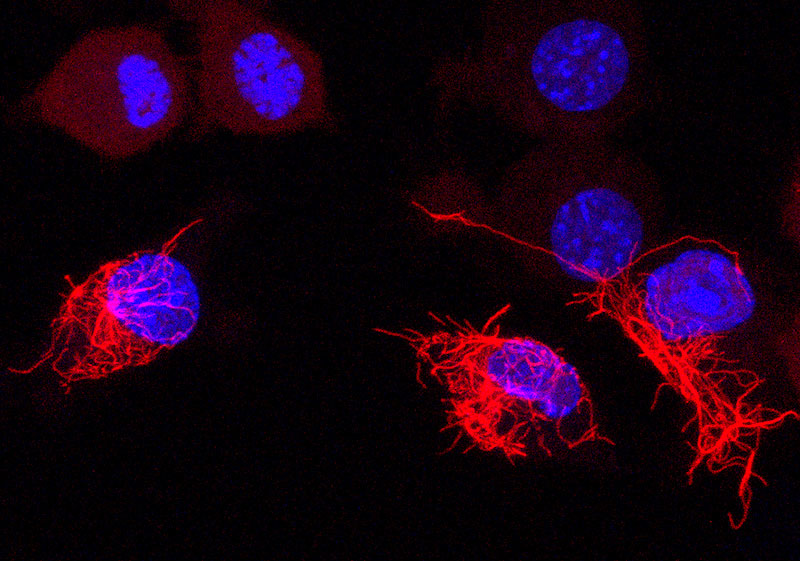Immune cells on alert: Inflammasome activates emergency program
The inflammasome plays an important role in our body‘s immune defense. This protein complex initiates an emergency program in the immune cells when invaded by a pathogen. In “Nature Communications”, a research team from the University of Basel’s Biozentrum reports that a specific inflammasome protein forms long filaments to amplify the inflammatory reaction.
22 June 2016
Immune cells are very sensitive to the presence of pathogens. When pathogens invade these cells, a protein complex – the inflammasome – is activated. Prof. Petr Broz’s team at the Biozentrum of the University of Basel demonstrated that this complex forms long filaments, which enables it to activate large amounts of messenger substances simultaneously and thus trigger severe inflammatory reactions. However, the study revealed that inflammasome-mediated cell death is not dependent on the formation of filaments. The death and destruction of infected immune cells is important, as this limits further microbe replication in these cells.
Protein filaments indispensable for inflammatory reactions
After an infection, phagocytic macrophages are first on the spot to eliminate the pathogens. Nevertheless, some of the microbes still manage to invade the immune cells, where they are recognized by specific receptors. These receptors, in turn, activate the inflammasome. In this process many so-called ASC proteins assemble long filaments. “The formation of such filaments is a very sophisticated mechanism for amplifying signals within the cell,” explains Broz. “Just one foreign molecule is sufficient to trigger a strong inflammatory response. The linked ASC protein filaments ensure the large production of pro-inflammatory cytokines. Like this, it only takes a drop to make a waterfall.”
Filament formation irrelevant for cell death
The scientists also discovered that not only the interconnected filaments play a vital role in the immune response: “For a long time, it was assumed that inflammasome-dependent inflammation and macrophage cell death are inseparable,” relates Mathias Dick, PhD student in Broz’s research group. “But, to our great surprise, programmed cell death is not dependent on filament formation.” Both inflammation and cell death are regulated by the inflammasome, but in different ways.
Inflammasome dysfunction in inflammatory diseases
A wide range of autoinflammatory diseases, such as chronic inflammatory bowel disease, diabetes or atherosclerosis are related to inflammasome dysfunction, characterized by a permanent activation of the protein complex and production of pro-inflammatory cytokines. As Broz explains, drugs, which can prevent ASC filament formation, could be a promising alternative to stop exceeding inflammatory responses in patients with autoimmune disease.
Original source
Mathias S. Dick, Lorenzo Sborgi, Sebastian Rühl, Sebastian Hiller and Petr Broz
ASC filament formation serves as a signal amplification mechanism for inflammasomes
Nature Communications (2016), doi: 10.1038/ncomms11929
Further information
- Prof. Dr. Petr Broz, University of Basel, Biozentrum, Tel. +41 61 267 23 42, email: petr.broz@unibas.ch
- Dr. Katrin Bühler, University of Basel, Communications Biozentrum, Tel. +41 61 267 09 74, email: katrin.buehler@unibas.ch


